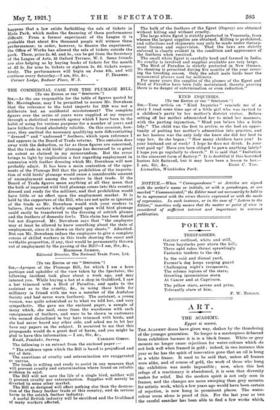[To THE EDITOR OF THE " SPECTATOR.") Sia,—Apropos of the
Plumage Bill, for which I am a keen partisan and upholder of the view taken by the Spectator, the following incident took place about a week ago, and may interest you. While buying a hat at a shop in Guildford, I saw a hat trimmed with a Bird of Paradise, and spoke to the assistant as to the cruelty, &c., in using these birds for millinery (a friend with me was a member of the Audubon Society and had never worn feathers). The assistant, a young woman, was quite astonished as to what we told her, and very sympathetic. She gave me the enclosed paper, .a sample of many, which, she said, came from the warehouse with each consignment of feathers, and were to be shown to customers who seemed disinclined to buy hats trimmed with birds, and she had never heard any other side, and asked me to let her have any papers on the subject. It occurred to me that this propaganda would do a great deal of harm, and you might be glad to have this information.— I am, Sir, &c.,
The following is an extract from the enclosed paper :- " The evidence upon which the Bill is based is prejudiced and out of date.
The assertions of cruelty and extermination are exaggerated or untrue.
The trade is willing and ready to assist in any measure that will prevent cruelty and extermination where found on reliable evidence to exist.
The Bill will not save the life of a single bird, neither will it prevent cruelty nor extermination. Supplies will merely be diverted to some other market.
The Bill as designed will effect nothing else than the destruc- tion of the fancy feather trade of this country, and do serious harm to the ostrich feather industry.
A useful British industry will be sacrificed and the livelihood of many workers affected. The bulk of the feathers of the Egret (Osprey) are obtained without killing and without cruelty.
The large white Egret is strictly protected in Venezuela, from whence the largest supplies are obtained. Killing is prohibited, and collections and shipments may only be made under Govern- ment licence and supervision. That the laws are strictly enforced is clearly evident in the condition and appearance of the feathers when received.
The small white Egret is carefully bred and farmed in India. No cruelty is involved and supplies available are very large. The Bird of Paradise is strictly protected in New Guinea. No shooting is permitted during five months of the year cover- ing the breeding season. Only the adult male birds bear the ornamental plumes used for millinery. For many years the supplies of the plumes of the Egret and Bird of Paradise have been fully maintained, thereby proving there is no danger of extermination or even reduction."


































 Previous page
Previous page